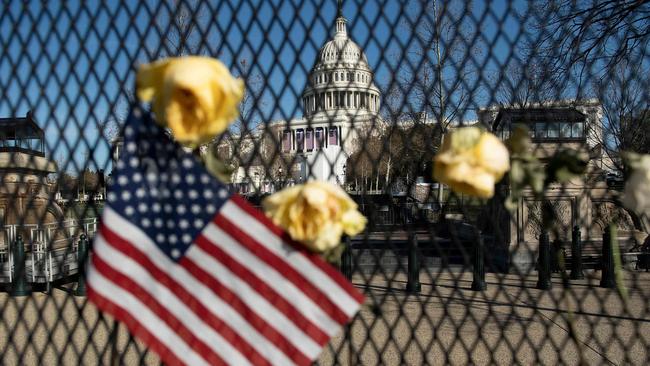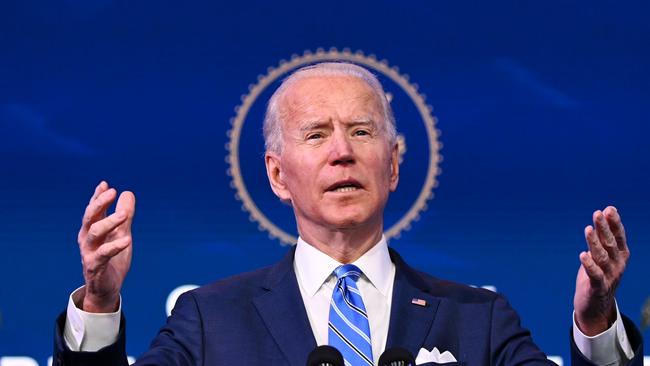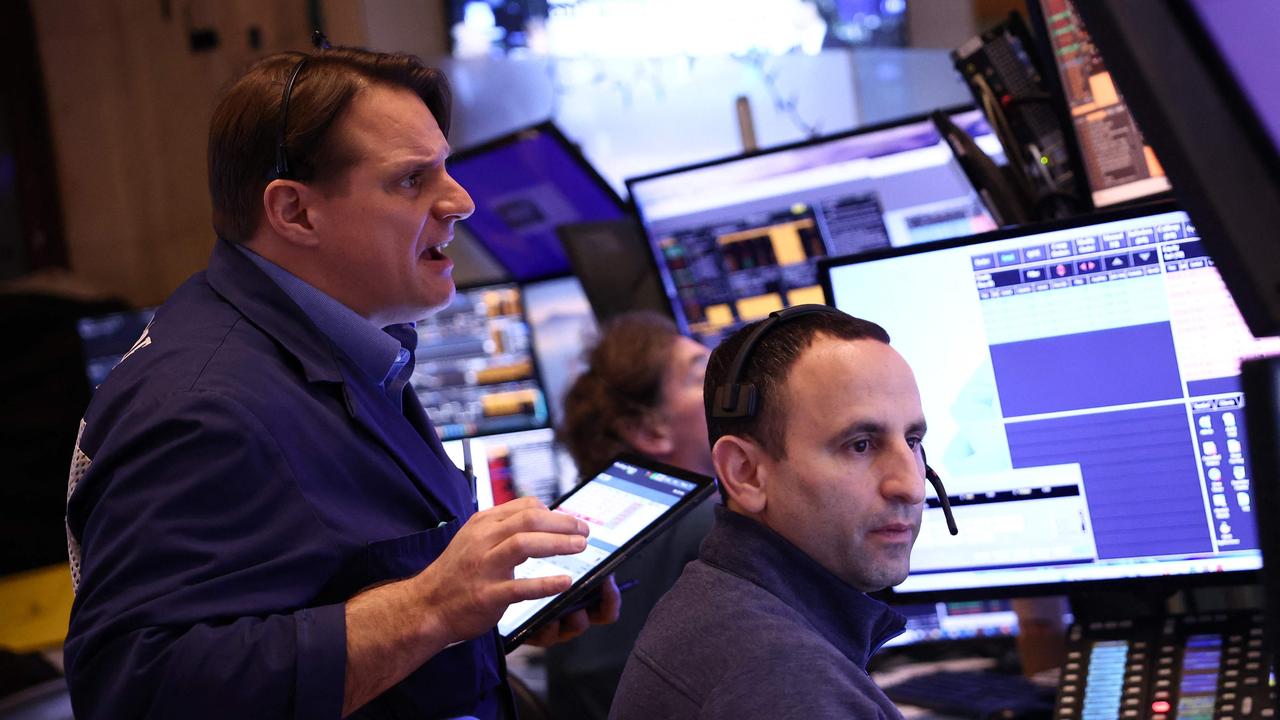US President-elect Joe Biden’s comment on taxes spooks markets
Investors reacted negatively as US president-elect Joe Biden raised the spectre of tax increases.

Investors reacted negatively as US president-elect Joe Biden raised the spectre of tax increases while announcing a highly anticipated $US1.9 trillion ($2.5 trillion) public spending plan on Friday.
The Australian sharemarket reversed an intraday rise and the dollar turned down, along with US index futures and industrial commodity prices including crude oil and copper.
Meanwhile US Treasury bonds and the US dollar rallied after strong gains in risk assets in recent months.
After rising 0.6 per cent to a four-day high of 6752.4 points as the incoming Biden administration flagged a $US1.9 trillion “pandemic aid bill”, consistent with Mr Biden’s call last week for “trillions of dollars” of stimulus to fight the pandemic, Australia’s S&P/ASX 200 index closed flat at 6715.3 points.
A 2.6 per cent rise to a 10-month high of 6757.87 last week marked the index’s best week since early November and its best first week of the year since 2001.
On Friday the dollar fell from US77.89c to US77.43c, S&P 500 futures tumbled 0.7 per cent, Comex copper futures fell 1.4 per cent and West Texas crude oil futures lost 1 per cent. Meanwhile the US dollar index rose 0.2 per cent and 10-year US Treasury bond yields fell three basis points to 1.1 per cent after Mr Biden spoke. “We have to act and we have to act now,” he said in Wilmington, Delaware.
Mr Biden vowed to lay out a second, broader economic recovery plan at a joint session of congress next month. That initiative would include money for longer-term development goals such as infrastructure and climate change, his transition team said.
His pandemic bill includes $US400bn for COVID-19 management, more than $US1 trillion in direct relief spending and $US440bn for communities and businesses, with a price tag more than twice as much as the bipartisan bill costing $US900bn approved last month. But Mr Biden’s spending plan — which is worth almost as much as the $US2.2 trillion Coronavirus Aid, Relief and Economic Security, or CARES Act, from the outgoing Trump administration, and carries Democratic Party goals including a higher minimum-wage rate — may face hurdles in the Senate.
While the US sharemarket hit record highs this week in anticipation of the economic growth boost implied by large-scale fiscal stimulus, the market was chilled by Mr Biden’s mention of tax increases.
“Where we are making permanent investments, as I said on the campaign, we will pay for them by making sure that everyone pays their fair share in taxes,” he said.
“We can do it without punishing anyone by closing tax loopholes for companies that ship American jobs overseas or that allow American companies to pay zero in federal income taxes.”
Australian and US shares faded slightly this week as benchmark US 10-year bond yields hit a 10-month high of 1.1855 per cent — up a substantial 28 basis points since early the previous week when opinion polls indicated that the Democrats would win both Senate seats up for grabs in Georgia runoffs, handing them a slim majority with the casting vote of vice-president Kamala Harris.
But US bond yields fell back sharply to 1.08 per cent as various Federal Reserve officials played down the prospect of any “tapering” of bond buying or other withdrawal of stimulus by the Fed.
“In terms of the pandemic relief stimulus, president-elect Biden’s announcement of a $US1.9 trillion plan is more than expected but its passage through congress is likely to see this cut back to around $US1.5 trillion,” said Shane Oliver, head of investment strategy and chief economist at AMP Capital.
Dr Oliver said it was hard to see all of its key elements — including $US1400 stimulus cheques, state aid, an extension of unemployment insurance, small business and rental support and an increase in the minimum wage to $US15 an hour — getting the necessary support of 60 senators. But if a budget reconciliation process was used, whereby the plan must be budget-neutral over 10 years, then it would only need a simple Senate majority of one vote to pass.
“Another plan focused on infrastructure, climate and other longer-term goals will come later,” Dr Oliver said.

“Tax hikes are to be expected, and probably necessary under the budget reconciliation, although moderate Democrats will limit tax hikes, which will reduce the ultimate size of the net stimulus, but for this year it’s still likely to be huge at around 10 per cent of US GDP.”
Taken together, Dr Oliver said this would further boost the US and hence global recovery, which along with COVID-19 vaccinations should be stronger than generally expected, pushing sharemarkets higher — particularly non-US shares as the US corporate tax rate went up. It was also expected to push bond yields moderately higher, lowering the US dollar and consequently helping the Australian dollar, and also favour cyclical value stocks over growth and defensive plays in the sharemarket.
“That said, sharemarkets and other recovery plays like the Australian dollar and bond yields have run hard and fast since early November and remain vulnerable to a short-term pullback,” Dr Oliver said.
“However, this should be viewed as just another correction before the rising trend resumes.”
JPMorgan’s asset allocation team increased its recommended overweight allocation to commodities, in particular energy, both as an inflation hedge and to position for economic recovery.
“Risky assets are enjoying a favourable environment for sustained gains, given a business cycle in global synchronised expansion as vaccines are distributed to end the pandemic, fading risks from the global trade war, COVID-19 pandemic, US election uncertainty, and Brexit, highly accommodative monetary and fiscal policy, and moderate investor positioning,” said JPMorgan head of cross asset strategy Marko Kolanovic.
“The Georgia Senate run-off resulted in a 50-50 Senate split and Democratic tie-breaker, which is likely to deliver another round of fiscal stimulus, and should lead to a pricing-out of political risk premia as we finally have clarity on the shape of the US government for the next two years.
“We expect 2021 to deliver the strongest year of global GDP growth in over two decades as mass vaccination permanently severs the link between the COVID-19 virus and economic activity.”
Mr Kolanovic sees an economic rebound supported by strong monetary accommodation and a larger than expected fiscal thrust, which led JPMorgan to upgrade its growth forecasts and anticipate that by the end of 2022, US GDP would surge above the path it was on pre-pandemic.







